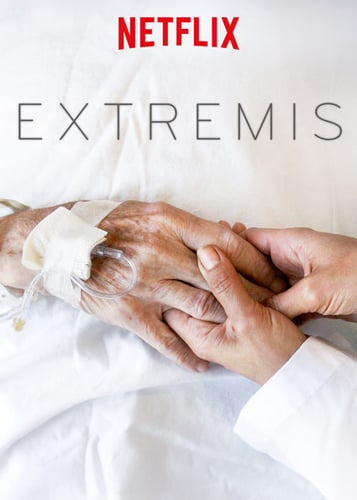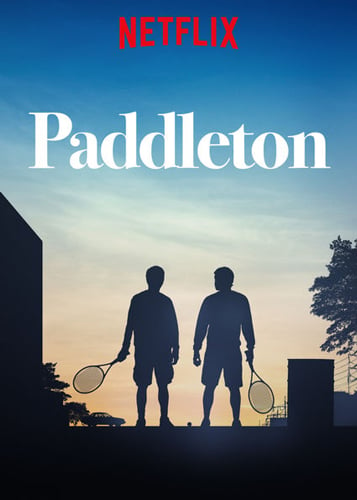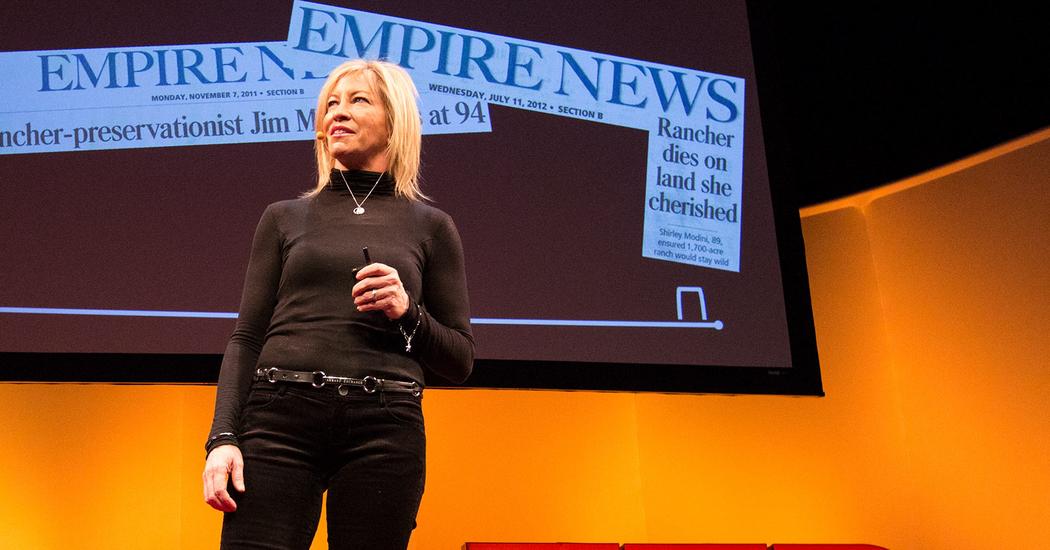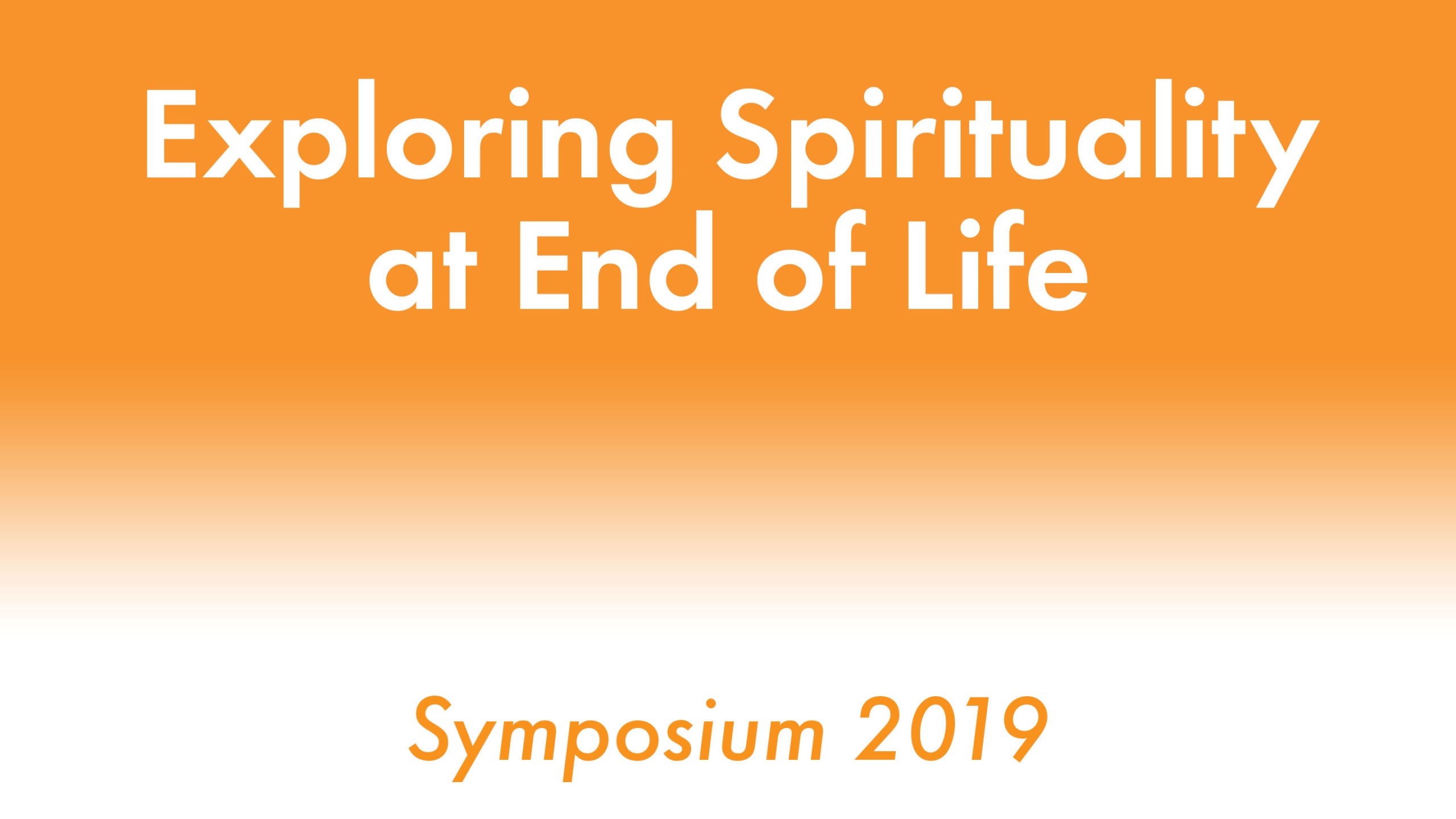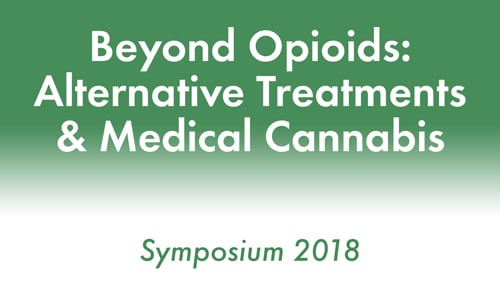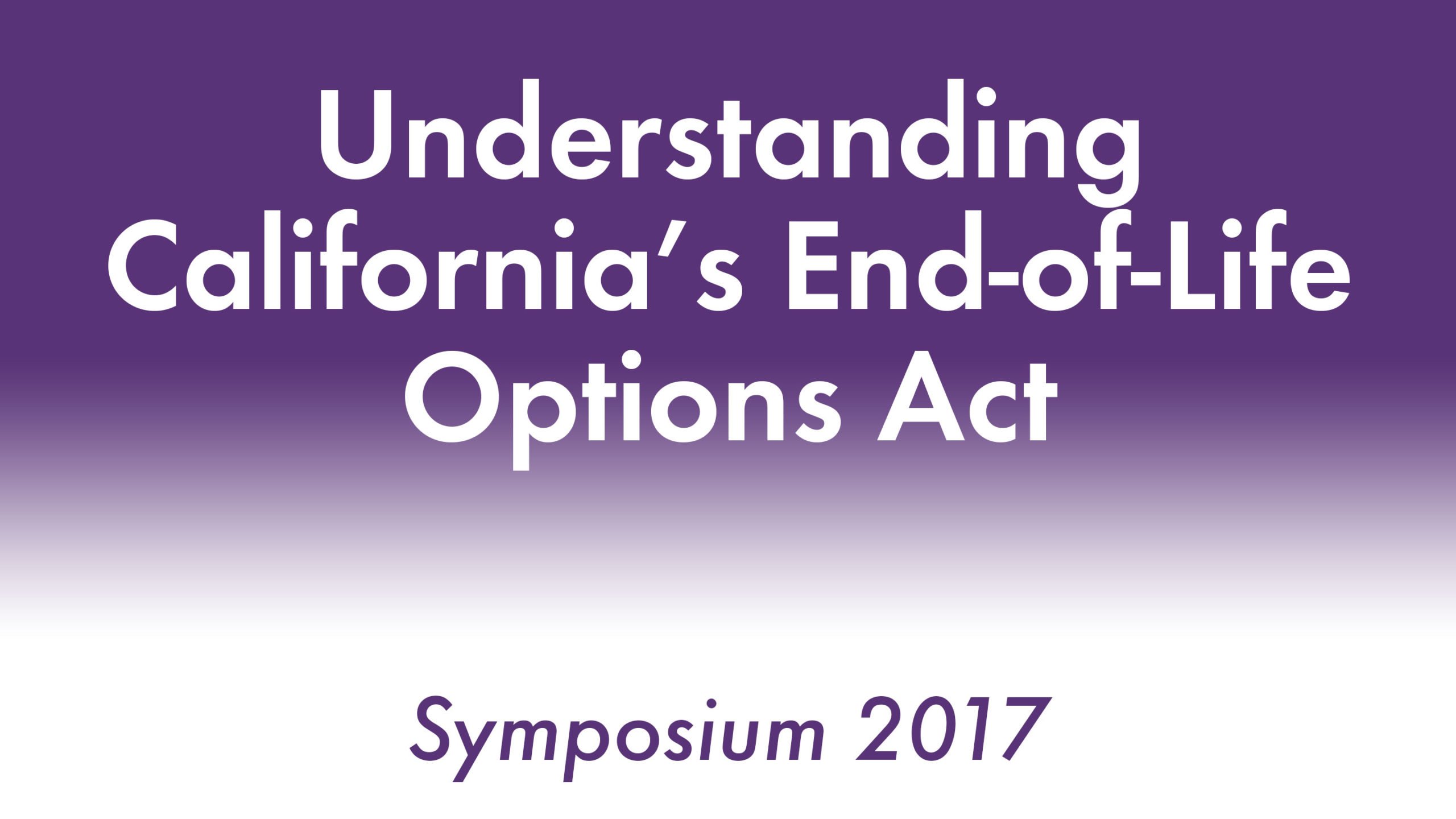RECOMMENDATIONS
HG Foundation provides resources to explore, understand, accept, and prepare for end of life. We offer a variety of options, knowing viewers enjoy choices and not everything appeals to everyone. We welcome your feedback or suggestions through our contact form. Clicking on book covers provides a synopsis; clicking on links for podcasts, films, or TED Talks will take you away from HG Foundation’s website.
READ
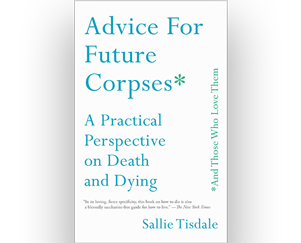
Advice for Future Corpses by Sallie Tisdale
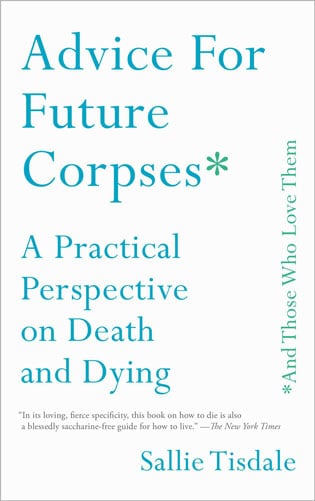 Former NEA fellow and Pushcart Prize-winning writer Sallie Tisdale offers a lyrical, thought-provoking, yet practical perspective on death and dying in Advice for Future Corpses (and Those Who Love Them). Informed by her many years working as a nurse, with more than a decade in palliative care, Tisdale provides a frank, direct, and compassionate meditation on the inevitable
Former NEA fellow and Pushcart Prize-winning writer Sallie Tisdale offers a lyrical, thought-provoking, yet practical perspective on death and dying in Advice for Future Corpses (and Those Who Love Them). Informed by her many years working as a nurse, with more than a decade in palliative care, Tisdale provides a frank, direct, and compassionate meditation on the inevitable
From the sublime (the faint sound of Mozart as you take your last breath) to the ridiculous (lessons on how to close the sagging jaw of a corpse), Tisdale leads us through the peaks and troughs of death with a calm, wise, and humorous hand. Advice for Future Corpses is more than a how-to manual or a spiritual bible: it is a graceful compilation of honest and intimate anecdotes based on the deaths Tisdale has witnessed in her work and life, as well as stories from cultures, traditions, and literature around the world.
Tisdale explores all the heartbreaking, beautiful, terrifying, confusing, absurd, and even joyful experiences that accompany the work of dying, including:
A Good Death: What does it mean to die “a good death”? Can there be more than one kind of good death? What can I do to make my death, or the deaths of my loved ones, good?
Communication: What to say and not to say, what to ask, and when, from the dying, loved ones, doctors, and more.
Last Months, Weeks, Days, and Hours: What you might expect, physically and emotionally, including the limitations, freedoms, pain, and joy of this unique time.
Bodies: What happens to a body after death? What options are available to me after my death, and how do I choose—and make sure my wishes are followed?
Grief: “Grief is the story that must be told over and over…Grief is the breath after the last one.”
Beautifully written and compulsively readable, Advice for Future Corpses offers the resources and reassurance that we all need for planning the ends of our lives and is essential reading for future corpses everywhere. “Sallie Tisdale’s elegantly understated new book pretends to be a user’s guide when in fact it’s a profound meditation” (David Shields, bestselling author of Reality Hunger).
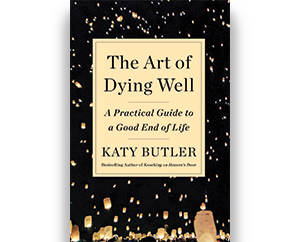
The Art of Dying Well by Katy Butler
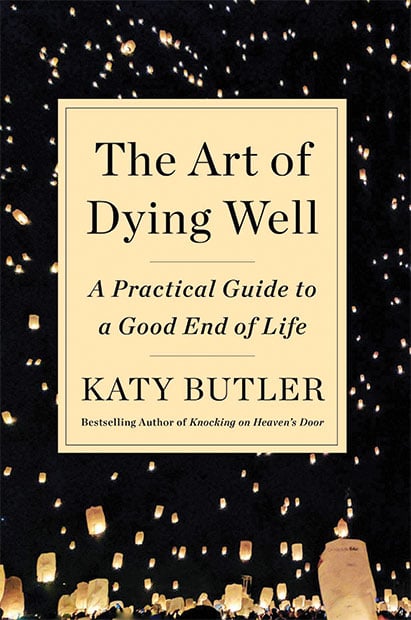 The Art of Dying – written by the New York Times bestselling author of Knocking on Heaven’s Door – is a reassuring and thoroughly researched guide to maintaining a high quality of life—from resilient old age to the first inklings of a serious illness to the final breath.
The Art of Dying – written by the New York Times bestselling author of Knocking on Heaven’s Door – is a reassuring and thoroughly researched guide to maintaining a high quality of life—from resilient old age to the first inklings of a serious illness to the final breath.
Packed with extraordinarily helpful insights and inspiring true stories, award-winning journalist Katy Butler shows how to thrive in later life, how to get the best from our health system, and how to make your own “good death” more likely. This handbook of step by step preparations—practical, communal, physical, and sometimes spiritual—will help you make the most of your remaining time, be it decades, years, or months.
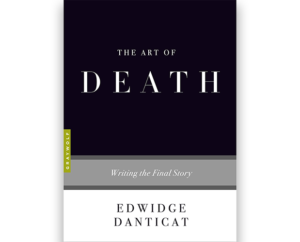
The Art of Death by Edwidge Danticat
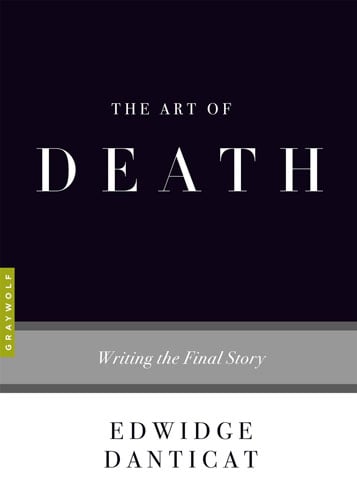 “She wanted something in between, just enough time to put her affairs in order and get a few things off her chest. She got her wish. Not everyone gets theirs.”
“She wanted something in between, just enough time to put her affairs in order and get a few things off her chest. She got her wish. Not everyone gets theirs.”
A moving reflection on a subject that touches us all, by the bestselling author of Claire of the Sea Light
Edwidge Danticat’s The Art of Death: Writing the Final Story is at once a personal account of her mother dying from cancer and a deeply considered reckoning with the ways that other writers have approached death in their own work. “Writing has been the primary way I have tried to make sense of my losses,” Danticat notes in her introduction. “I have been writing about death for as long as I have been writing.” The book moves outward from the shock of her mother’s diagnosis and sifts through Danticat’s writing life and personal history, all the while shifting fluidly from examples that range from Gabriel García Márquez’s One Hundred Years of Solitude to Toni Morrison’s Sula. The narrative, which continually circles the many incarnations of death from individual to large-scale catastrophes, culminates in a beautiful, heartrending prayer in the voice of Danticat’s mother. A moving tribute and a work of astute criticism, The Art of Death is a book that will profoundly alter all who encounter it.
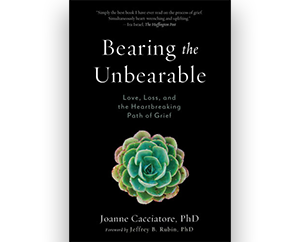
Bearing the Unbearable by Joanne Cacciatore
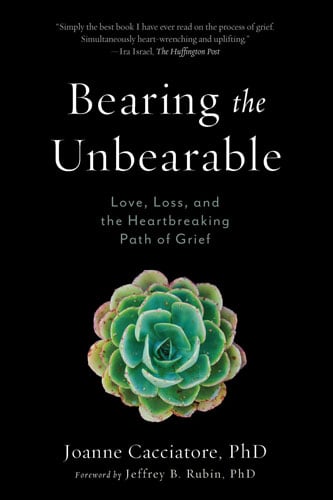 When a loved one dies, the pain of loss can feel unbearable—especially in the case of a traumatizing death that leaves us shouting, “NO!” with every fiber of our body. The process of grieving can feel wild and nonlinear—and often lasts for much longer than other people, the nonbereaved, tell us it should.
When a loved one dies, the pain of loss can feel unbearable—especially in the case of a traumatizing death that leaves us shouting, “NO!” with every fiber of our body. The process of grieving can feel wild and nonlinear—and often lasts for much longer than other people, the nonbereaved, tell us it should.
Organized into fifty-two short chapters, Bearing the Unbearable is a companion for life’s most difficult times, revealing how grief can open our hearts to connection, compassion, and the very essence of our shared humanity. Dr. Joanne Cacciatore—bereavement educator, researcher, Zen priest, and leading counselor in the field—accompanies us along the heartbreaking path of love, loss, and grief. Through moving stories of her encounters with grief over decades of supporting individuals, families, and communities—as well as her own experience with loss—Cacciatore opens a space to process, integrate, and deeply honor our grief.
Not just for the bereaved, Bearing the Unbearable will be required reading for grief counselors, therapists and social workers, clergy of all varieties, educators, academics, and medical professionals. Organized into fifty-two accessible and stand-alone chapters, this book is also perfect for being read aloud in support groups.
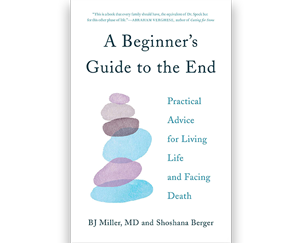
A Beginner's Guide to the End
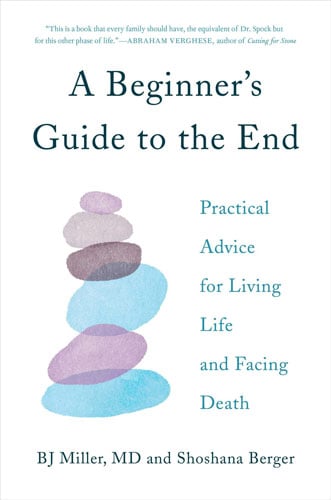 The first ever practical, compassionate, and comprehensive guide to dying—and living fully until you do.
The first ever practical, compassionate, and comprehensive guide to dying—and living fully until you do.
“There is nothing wrong with you for dying,” palliative care doctor B.J. Miller and Shoshana Berger write in A Beginner’s Guide to the End. “Our ultimate purpose here isn’t so much to help you die as it is to free up as much life as possible until you do.”
Theirs is a clear-eyed and big-hearted action plan for approaching the end of life, written to help readers feel more in control of an experience that so often seems anything but controllable. Their book offers everything from step-by-step instructions for how to do your paperwork and navigate the healthcare system to answers to questions you might be afraid to ask your doctor, like whether or not sex is still okay when you’re sick. You’ll be walked through how to break the news to your employer, whether to share old secrets with your family, how to face friends who might not be as empathetic as you’d hoped, and to how to talk to your children about your will. (Don’t worry: if anyone gets snippy, it’ll likely be their spouses, not them.) There are also lessons for survivors, like how to shut down a loved one’s social media accounts, clean out the house, and write a great eulogy.
An honest, surprising, and detailed-oriented guide to the most universal of all experiences, A Beginner’s Guide to the End is the one book that everyone needs.
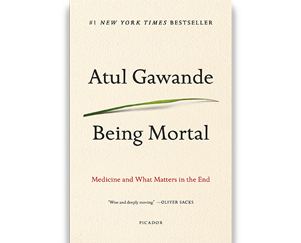
Being Mortal by Atul Gawande
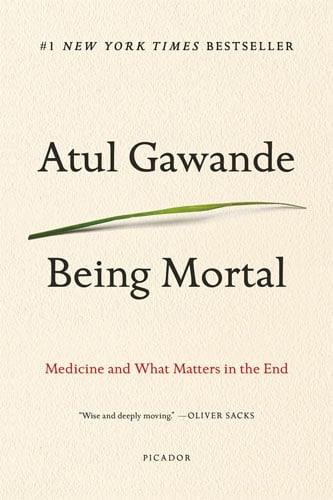 Being Mortal was named Best Book of the Year by The Washington Post, The New York Times Book Review, NPR, and the Chicago Tribune.
Being Mortal was named Best Book of the Year by The Washington Post, The New York Times Book Review, NPR, and the Chicago Tribune.
Through eye-opening research and gripping stories of his own patients and family, Atul Gawande, a practicing surgeon, has fearlessly revealed the struggles of his profession. Riveting, honest, and humane, Being Mortal shows how the ultimate goal is not a good death but a good life-all the way to the very end.
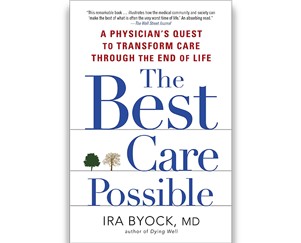
The Best Care Possible by Ira Byock, MD
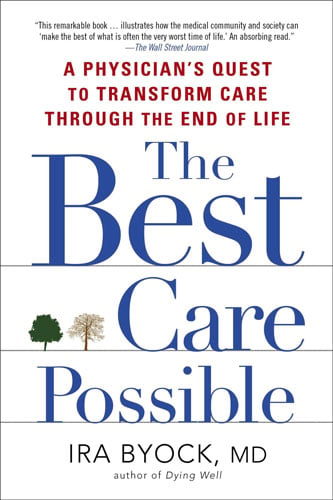 Dr. Ira Byock, a doctor on the front lines of hospital care, illuminates the most important and controversial social issues of our time in The Best Care Possible.
Dr. Ira Byock, a doctor on the front lines of hospital care, illuminates the most important and controversial social issues of our time in The Best Care Possible.
One of the foremost palliative-care physicians in the country, Dr. Ira Byock argues that how we die represents a national crisis. To ensure the best possible elder care, Dr. Byock explains we must not only remake our healthcare system but also move beyond our cultural aversion to thinking about death.
The Best Care Possible is a compelling meditation on medicine and ethics told through page-turning life-or-death medical drama. It has paved the way for a national conversation.
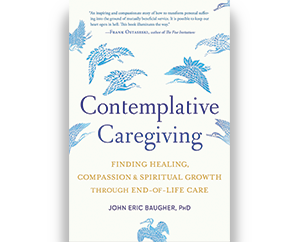
Contemplative Caregiving by John Eric Baugher, Ph.D.
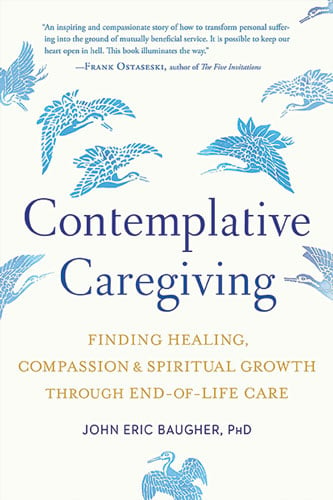 Blending personal insights from twenty-five years of hospice volunteering with contemplative social science research, Contemplative Caregiving offers practical lessons about the transformative possibilities of compassionate end-of-life caregiving.
Blending personal insights from twenty-five years of hospice volunteering with contemplative social science research, Contemplative Caregiving offers practical lessons about the transformative possibilities of compassionate end-of-life caregiving.
After author John Baugher’s mother was murdered in 1987, Baugher turned to hospice volunteering as a way to channel his experience, marking the beginning of a twenty-five-year journey of exploration–in both public hospices and prison hospice programs–and the possibility of discovering compassion and even humor in the face of death. In this beautifully written book, Baugher weaves together insights from his experience with those gleaned from interviews with dozens of hospice volunteers from widely varying backgrounds.
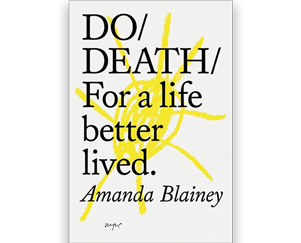
Do Death by Amanda Blainey
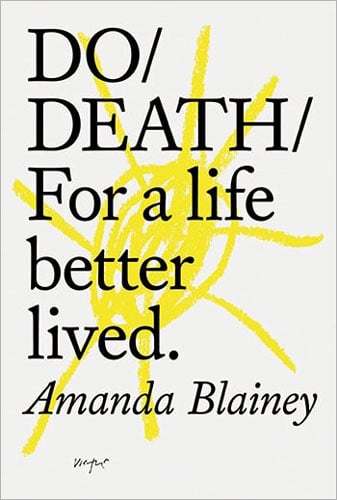 Death has a 100 per cent success rate. We can’t escape its inevitability, nor can we deny its existence. So, when someone close to us dies or we are confronted by our own mortality, why are we utterly unprepared?
Death has a 100 per cent success rate. We can’t escape its inevitability, nor can we deny its existence. So, when someone close to us dies or we are confronted by our own mortality, why are we utterly unprepared?
In Do Death, social activist Amanda Blainey seeks to transform our lives through our relationship with death. By inviting us to accept death as a natural part of life, she encourages us to think about what really matters – and live more consciously. With uplifting wisdom from leaders and visionaries, Do Death will:
- Help us rediscover the power of human connection
- Inspire us to think and talk about death more openly
- Offer sage advice on how to navigate grief, and talk to children
- Empower us to be better prepared, both practically and emotionally
Death can be our greatest teacher. This book is a manual for living, at any stage in life.
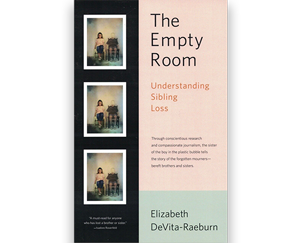
The Empty Room by Elizabeth DeVita-Raeburn
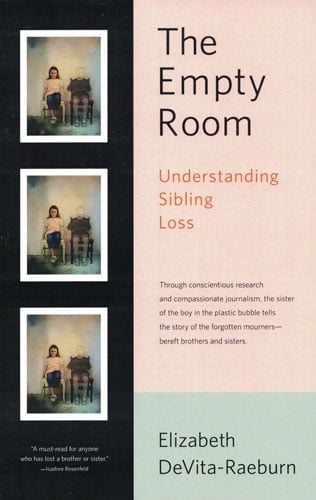 Ted is Elizabeth DeVita-Raeburn’s older brother, best friend, and the “ringmaster of her days.” On a September morning when she is six, she wakes up and Ted is gone. Her parents explain that he went to the hospital for a while. “A while” turns out to be eight years in a plastic bubble, where he dies of a rare autoimmune disease at age seventeen.
Ted is Elizabeth DeVita-Raeburn’s older brother, best friend, and the “ringmaster of her days.” On a September morning when she is six, she wakes up and Ted is gone. Her parents explain that he went to the hospital for a while. “A while” turns out to be eight years in a plastic bubble, where he dies of a rare autoimmune disease at age seventeen.
The Empty Room is DeVita-Raeburn’s unflinching, often haunting recollection of life with Ted, woven into a larger exploration of the enormous — and often unacknowledged — impact of a sister’s or brother’s death on remaining siblings.
With an inspired blend of life experience, journalistic acumen, and research training, DeVita-Raeburn draws on interviews of more than two hundred survivors to render a powerful portrait of the range of conditions and emotions, from withdrawal to guilt to rage, that attend such loss. Finding little in professional literature, she realizes that those who suffer are the experts. And in the end, it is DeVita-Raeburn and her experts who present a larger, more complex understanding of the sibling bond, the lifelong impact of the severing of that bond, and the tools needed to heal and move forward.
The Empty Room is a fascinating literary hybrid in which Elizabeth DeVita-Raeburn seamlessly fuses deeply affecting remembrance with a pragmatic, lucidly written exploration of the healing journey.
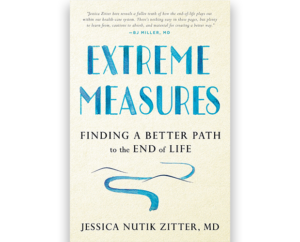
Extreme Measures by Jessica Nutik Zitter, MD
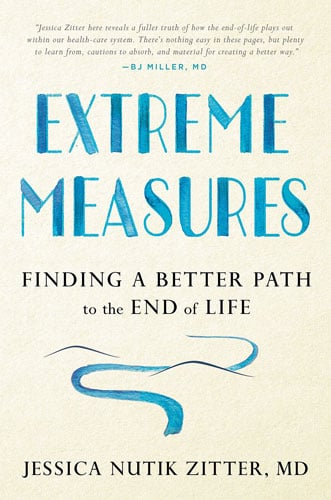 For readers of Being Mortal and Modern Death, an ICU and Palliative Care specialist offers a framework for a better way to exit life that will change our medical culture at the deepest level
For readers of Being Mortal and Modern Death, an ICU and Palliative Care specialist offers a framework for a better way to exit life that will change our medical culture at the deepest level
In medical school, no one teaches you how to let a patient die.
Jessica Zitter became a doctor because she wanted to be a hero. She elected to specialize in critical care—to become an ICU physician—and imagined herself swooping in to rescue patients from the brink of death. But then during her first code she found herself cracking the ribs of a patient so old and frail it was unimaginable he would ever come back to life. She began to question her choice.
Extreme Measures charts Zitter’s journey from wanting to be one kind of hero to becoming another—a doctor who prioritizes the patient’s values and preferences in an environment where the default choice is the extreme use of technology. In our current medical culture, the old and the ill are put on what she terms the End-of-Life Conveyor belt. They are intubated, catheterized, and even shelved away in care facilities to suffer their final days alone, confused, and often in pain. In her work Zitter has learned what patients fear more than death itself: the prospect of dying badly. She builds bridges between patients and caregivers, formulates plans to allay patients’ pain and anxiety, and enlists the support of loved ones so that life can end well, even beautifully.
Filled with rich patient stories that make a compelling medical narrative, Extreme Measures enlarges the national conversation as it thoughtfully and compassionately examines an experience that defines being human.
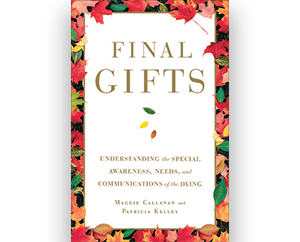
Final Gifts by Maggie Callanan and Patricia Kelley
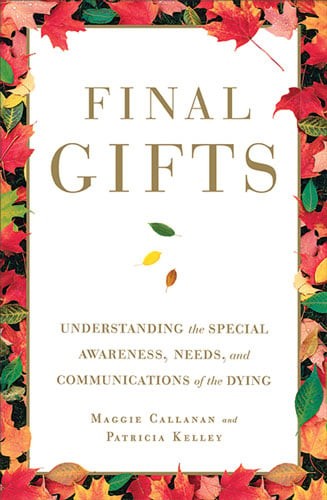 In this moving and compassionate classic, hospice nurses Maggie Callanan and Patricia Kelley share their intimate experiences with patients at the end of life, drawn from more than twenty years’ experience tending the terminally ill.
In this moving and compassionate classic, hospice nurses Maggie Callanan and Patricia Kelley share their intimate experiences with patients at the end of life, drawn from more than twenty years’ experience tending the terminally ill.
Filled with practical advice on responding to the requests of the dying and helping them prepare emotionally and spiritually for death, Final Gifts shows how we can help the dying person live fully to the very end.
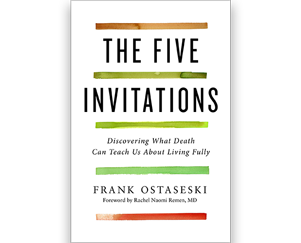
The Five Invitations by Frank Ostaseski
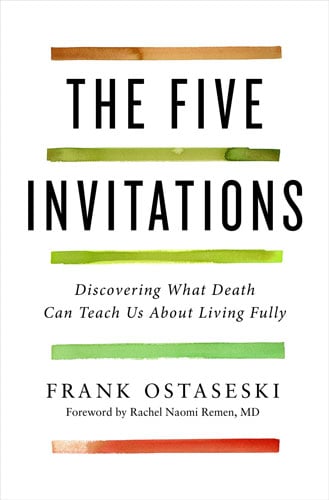 The cofounder of the Zen Hospice Project and pioneer behind the compassionate care movement shares an inspiring exploration of the lessons dying has to offer about living a fulfilling life.
The cofounder of the Zen Hospice Project and pioneer behind the compassionate care movement shares an inspiring exploration of the lessons dying has to offer about living a fulfilling life.
Death is not waiting for us at the end of a long road. Death is always with us, in the marrow of every passing moment. She is the secret teacher hiding in plain sight, helping us to discover what matters most.
Life and death are a package deal. They cannot be pulled apart and we cannot truly live unless we are aware of death. The Five Invitations is an exhilarating meditation on the meaning of life and how maintaining an ever-present consciousness of death can bring us closer to our truest selves. As a renowned teacher of compassionate caregiving and the cofounder of the Zen Hospice Project, Frank Ostaseski has sat on the precipice of death with more than a thousand people. In The Five Invitations, he distills the lessons gleaned over the course of his career, offering an evocative and stirring guide that points to a radical path to transformation.
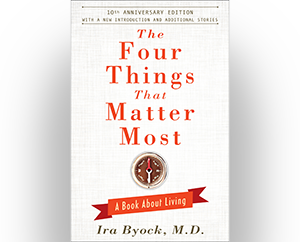
The Four Things That Matter Most by Ira Byock, M.D.
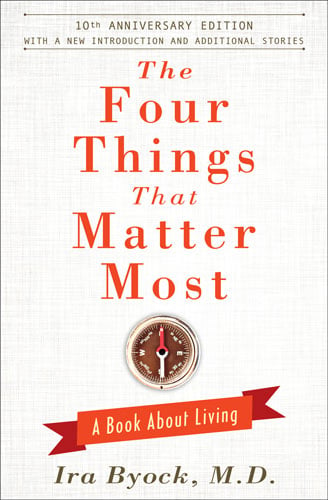 Four simple phrases— “Please forgive me,” “I forgive you,” “Thank you,” and “I love you”—carry enormous power to mend and nurture our relationships and inner lives. These four phrases and the sentiments they convey provide a path to emotional wellbeing, guiding us through interpersonal difficulties to life with integrity and grace.
Four simple phrases— “Please forgive me,” “I forgive you,” “Thank you,” and “I love you”—carry enormous power to mend and nurture our relationships and inner lives. These four phrases and the sentiments they convey provide a path to emotional wellbeing, guiding us through interpersonal difficulties to life with integrity and grace.
Dr. Ira Byock, an international leader in palliative care, explains how we can practice these life-affirming words in our day-to-day lives. Too often we assume that the people we love really know that we love them.
Using the Four Things in a wide range of life situations, we can experience emotional healing even in the wake of family strife, personal tragedy, divorce, or in the face of death. With practical wisdom and spiritual power, The Four Things That Matter Most gives us the language and guidance to honor and experience what really matters most in our lives every day.
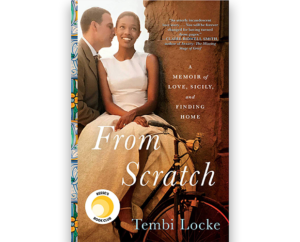
From Scratch by Tembi Locke
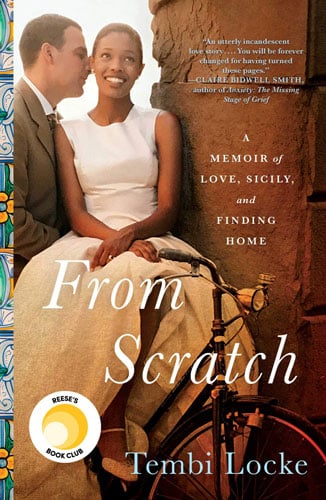 A poignant and transporting cross-cultural love story set against the lush backdrop of the Sicilian countryside, where one woman discovers the healing powers of food, family, and unexpected grace in her darkest hour.
A poignant and transporting cross-cultural love story set against the lush backdrop of the Sicilian countryside, where one woman discovers the healing powers of food, family, and unexpected grace in her darkest hour.
It was love at first sight when Tembi met professional chef, Saro, on a street in Florence. There was just one problem: Saro’s traditional Sicilian family did not approve of him marrying a black American woman, an actress no less. However, the couple, heartbroken but undeterred, forges on. They build a happy life in Los Angeles, with fulfilling careers, deep friendships and the love of their lives: a baby girl they adopt at birth. Eventually, they reconcile with Saro’s family just as he faces a formidable cancer that will consume all their dreams.
From Scratch chronicles three summers Tembi spends in Sicily with her daughter, Zoela, as she begins to piece together a life without her husband in his tiny hometown hamlet of farmers. Where once Tembi was estranged from Saro’s family and his origins, now she finds solace and nourishment—literally and spiritually—at her mother in law’s table. In the Sicilian countryside, she discovers the healing gifts of simple fresh food, the embrace of a close-knit community, and timeless traditions and wisdom that light a path forward. All along the way she reflects on her and Saro’s incredible romance—an indelible love story that leaps off the pages.
In Sicily, it is said that every story begins with a marriage or a death—in Tembi Locke’s case, it is both. Her story is about loss, but it’s really about love found. Her story is about travel, but it’s really about finding a home. It is about food, but it’s really about chasing flavor as an act of remembrance. From Scratch is for anyone who has dared to reach for big love, fought for what mattered most, and needed a powerful reminder that life is…delicious.
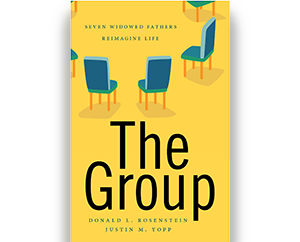
The Group by Donald L. Rosenstein and Justin M. Yopp
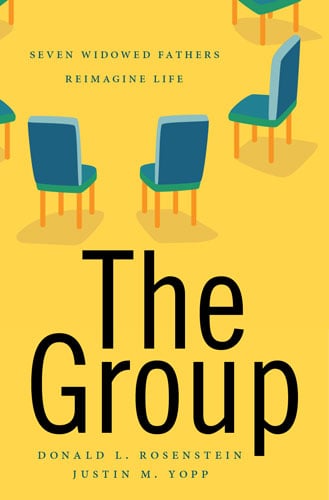 The Group offers a singular perspective on grief by weaving together the latest thinking on bereavement, resiliency and post-traumatic growth with the true story of seven men who were raising children on their own after the deaths of their wives. The men connected with each almost immediately, and over the next several years forged a deep bond as their monthly meetings evolved into a forum for healing and personal reinvention that transformed them in unexpected ways.
The Group offers a singular perspective on grief by weaving together the latest thinking on bereavement, resiliency and post-traumatic growth with the true story of seven men who were raising children on their own after the deaths of their wives. The men connected with each almost immediately, and over the next several years forged a deep bond as their monthly meetings evolved into a forum for healing and personal reinvention that transformed them in unexpected ways.
The authors co-led the support group and partnered with the men to write their story, which is interspersed with the latest in bereavement research conveyed in an easily relatable way. The fathers’ touching efforts to care for themselves, their families, and each other offers a gripping narrative that shows how each of us has the potential to rebuild new and meaningful lives.
Powerful, enlightening and hopeful, The Group will help you make sense of grief and inspire you to reimagine your life moving forward.
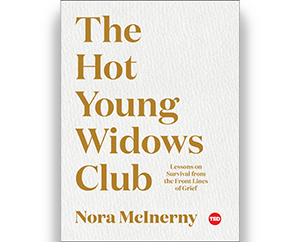
The Hot Young Widows Club by Nora McInerny
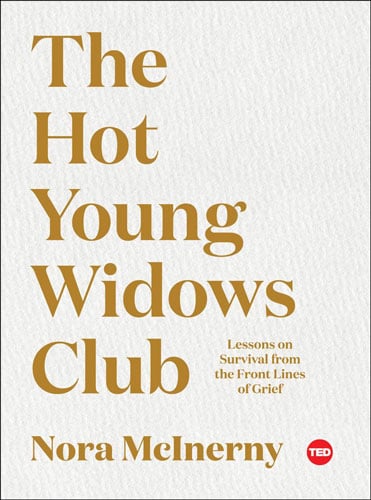 From the host of the popular podcast, Terrible, Thanks for Asking, comes a wise, humorous roadmap and caring resource for anyone going through the loss of a loved one—or even a difficult life moment.
From the host of the popular podcast, Terrible, Thanks for Asking, comes a wise, humorous roadmap and caring resource for anyone going through the loss of a loved one—or even a difficult life moment.
In the span of a few weeks, thirty-something Nora McInerny had a miscarriage, lost her father to cancer, and lost her husband due to a brain tumor. Her life fell apart. Based on her own experiences and those of the listeners dedicated to her podcast, Terrible, Thanks for Asking, Nora offers wise, heartfelt, and often humorous advice to anyone navigating a painful period in their lives. She explores how readers can educate the people around them
The Hot Young Widows Club is an essential tool for anyone who has gone through a major life struggle helping others understand what to do, what to say, and how to best to lend their support. This book is a space for people to recognize that they aren’t alone, and to learn how to get through life’s hardest moments with grace, humor, and hope.
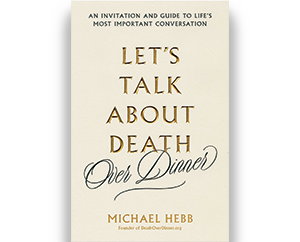
Let's Talk About Death Over Dinner by Michael Hebb
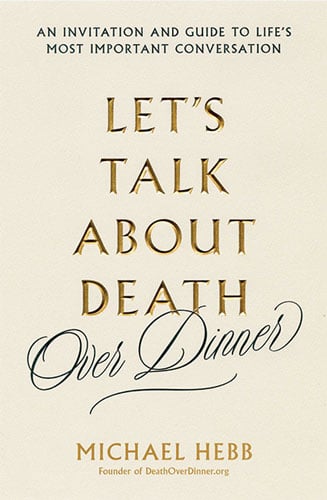 Of the many critical conversations we will all have throughout our lifetime; few are as important as the ones discussing death. Yet few of these conversations are happening. Inspired by his experience with his own father and countless stories from others who regret not having these conversations, Michael Hebb cofounded Death Over Dinner–an organization that encourages people to pull up a chair, break bread, and talk about the one thing we all have in common
Of the many critical conversations we will all have throughout our lifetime; few are as important as the ones discussing death. Yet few of these conversations are happening. Inspired by his experience with his own father and countless stories from others who regret not having these conversations, Michael Hebb cofounded Death Over Dinner–an organization that encourages people to pull up a chair, break bread, and talk about the one thing we all have in common
Death Over Dinner has been one of the most effective end-of-life awareness campaigns to date. it has provided the framework and inspiration for more than a hundred thousand dinners focused on having end-of-life conversations.
Let’s Talk About Death (Over Dinner) offers keen practical advice on how to have these same conversations–not just at the dinner table, but anywhere. By transforming the most difficult conversations into an opportunity, they become celebratory and meaningful in ways that not only can change the way we die, but the way we live.
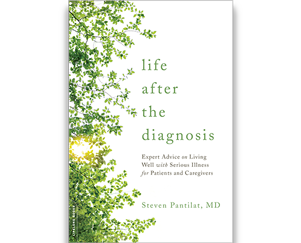
Life after the Diagnosis by Steven Pantilat, MD
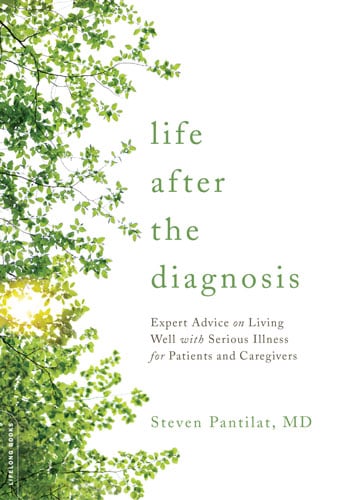 In Life After the Diagnosis, Dr. Steven Z. Pantilat, a renowned international expert in palliative care demystifies the medical system for patients and their families. He makes sense of what doctors say, what they actually mean, and how to get the best information to help make the best medical decisions.
In Life After the Diagnosis, Dr. Steven Z. Pantilat, a renowned international expert in palliative care demystifies the medical system for patients and their families. He makes sense of what doctors say, what they actually mean, and how to get the best information to help make the best medical decisions.
Dr. Pantilat covers everything from the first steps after a diagnosis and finding the right caregiving and support, to planning your future so your loved ones don’t have to. He offers advice on how to tackle the most difficult treatment decisions and discussions, shows readers how to choose treatments that help more than they hurt, stay consistent with their values and personal goals, and live as well as possible for as long as possible.
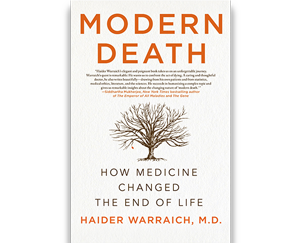
Modern Death by Haider Warraich, M.D.
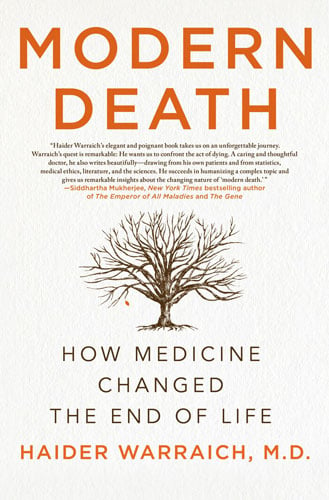 Dr. Haider Warraich is a young and brilliant voice in the conversation about death and dying. Dr. Warraich takes a broader look at how we die today, from the cellular level up to the very definition of death itself.
Dr. Haider Warraich is a young and brilliant voice in the conversation about death and dying. Dr. Warraich takes a broader look at how we die today, from the cellular level up to the very definition of death itself.
Modern Death explores the rituals and language of dying that have developed in the last century, and how modern technology has not only changed the hows, whens, and wheres of death, but the what of death.
This book provides readers with an enriched understanding of how death differs from the past, what our ancestors got right, and how trends and events have transformed this most final of human experiences.
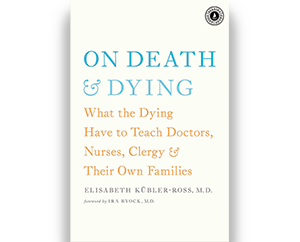
On Death & Dying by Elizabeth Kübler-Ross, M.D.
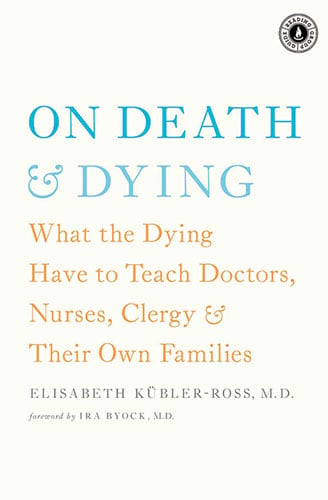 One of the most important psychological studies of the late twentieth century, On Death and Dying grew out of Dr. Elisabeth Kübler-Ross’s famous interdisciplinary seminar on death, life, and transition. In this remarkable book, Dr. Kübler-Ross explores the now-famous five stages of death: denial and isolation, anger, bargaining, depression, and acceptance. Through sample interviews and conversations, she gives readers a better understanding of how imminent death affects the patient, the professionals who serve that patient, and the patient’s family, bringing hope to all who are involved.
One of the most important psychological studies of the late twentieth century, On Death and Dying grew out of Dr. Elisabeth Kübler-Ross’s famous interdisciplinary seminar on death, life, and transition. In this remarkable book, Dr. Kübler-Ross explores the now-famous five stages of death: denial and isolation, anger, bargaining, depression, and acceptance. Through sample interviews and conversations, she gives readers a better understanding of how imminent death affects the patient, the professionals who serve that patient, and the patient’s family, bringing hope to all who are involved.
This edition includes an enlightening introduction by Dr. Ira Byock, a prominent palliative care physician and the author of Dying Well.
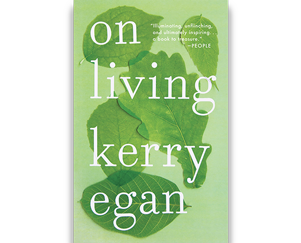
On Living by Kerry Egan
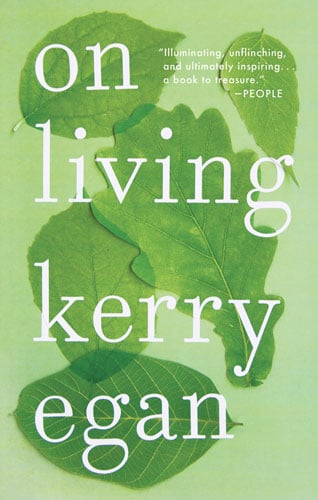 As a hospice chaplain, Kerry Egan discovered she’d been granted a powerful chance to witness firsthand what she calls the “spiritual work of dying”—the work of finding or making meaning of one’s life. Instead of talking, she mainly listened to stories of hope and regret, shame and pride, mystery and revelation and secrets held too long. Most of all, though, she listened as her patients talked about love—love for their children and partners and friends; love they didn’t know how to offer; love they gave unconditionally; love they, sometimes belatedly, learned to grant themselves.
As a hospice chaplain, Kerry Egan discovered she’d been granted a powerful chance to witness firsthand what she calls the “spiritual work of dying”—the work of finding or making meaning of one’s life. Instead of talking, she mainly listened to stories of hope and regret, shame and pride, mystery and revelation and secrets held too long. Most of all, though, she listened as her patients talked about love—love for their children and partners and friends; love they didn’t know how to offer; love they gave unconditionally; love they, sometimes belatedly, learned to grant themselves.
On Living isn’t a book about dying—it’s a book about living. And Egan isn’t just passively bearing witness to these stories. Each of her patients taught her something about what matters in the end—how to find courage in the face of fear or the strength to make amends; how to be profoundly compassionate and fiercely empathetic; how to see the world in grays instead of black and white.
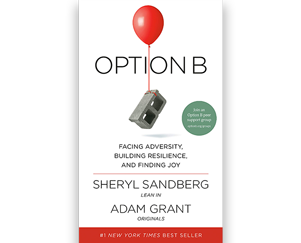
Option B by Sheryl Sandberg and Adam Grant
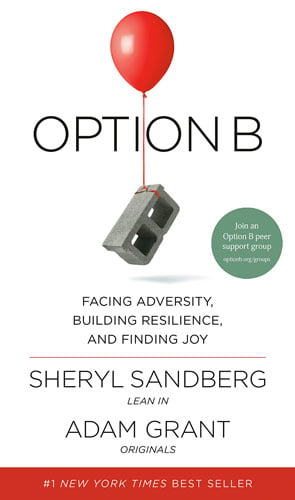 From Facebook’s COO and Wharton’s top-rated professor, the #1 New York Times best-selling authors of Lean In and Originals: a powerful, inspiring, and practical book about building resilience and moving forward after life’s inevitable setbacks.
From Facebook’s COO and Wharton’s top-rated professor, the #1 New York Times best-selling authors of Lean In and Originals: a powerful, inspiring, and practical book about building resilience and moving forward after life’s inevitable setbacks.
After the sudden death of her husband, Sheryl Sandberg felt certain that she and her children would never feel pure joy again. “I was in ‘the void,’” she writes, “a vast emptiness that fills your heart and lungs and restricts your ability to think or even breathe.” Her friend Adam Grant, a psychologist at Wharton, told her there are concrete steps people can take to recover and rebound from life-shattering experiences. We are not born with a fixed amount of resilience. It is a muscle that everyone can build.
Option B combines Sheryl’s personal insights with Adam’s eye-opening research on finding strength in the face of adversity. Beginning with the gut-wrenching moment when she finds her husband, Dave Goldberg, collapsed on a gym floor, Sheryl opens up her heart—and her journal—to describe the acute grief and isolation she felt in the wake of his death. But Option B goes beyond Sheryl’s loss to explore how a broad range of people have overcome hardships including illness, job loss, sexual assault, natural disasters, and the violence of war. Their stories reveal the capacity of the human spirit to persevere . . . and to rediscover joy.
Resilience comes from deep within us and from support outside us. Even after the most devastating events, it is possible to grow by finding deeper meaning and gaining greater appreciation in our lives. Option B illuminates how to help others in crisis, develop compassion for ourselves, raise strong children, and create resilient families, communities, and workplaces. Many of these lessons can be applied to everyday struggles, allowing us to brave whatever lies ahead. Two weeks after losing her husband, Sheryl was preparing for a father-child activity. “I want Dave,” she cried. Her friend replied, “Option A is not available,” and then promised to help her make the most of Option B.
We all live some form of Option B. This book will help us all make the most of it.
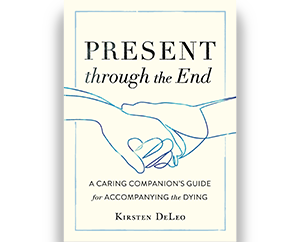
Present through the End by Kirsten DeLeo
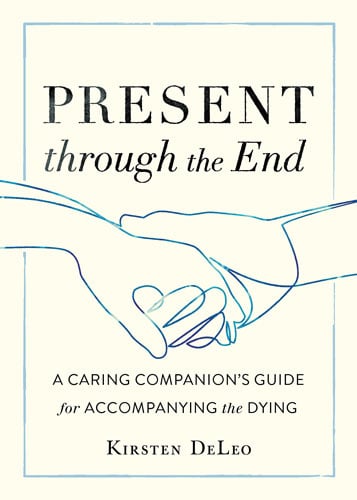 Present Through the End is a go-to resource for everyone supporting someone at the end of life–from the moment we first learn that someone is dying through the time of death and beyond.
Present Through the End is a go-to resource for everyone supporting someone at the end of life–from the moment we first learn that someone is dying through the time of death and beyond.
Inspired by decades of experience caring for the dying and years teaching contemplative care around the world, Kirsten DeLeo shares down-to-earth advice and offers simple tools to help us handle our emotions, deal with difficult relationships, talk about spiritual matters, practice self-care, listen fully, and more.
This book offers insight to be present when we may feel helpless, love when loss is just around the corner, and be fully alive to each moment as time runs out.
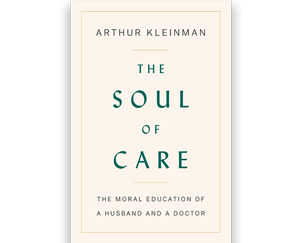
The Soul of Care by Arthur Kleinman
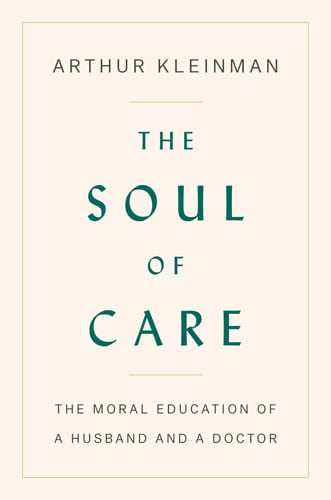 A moving memoir and an extraordinary love story that shows how an expert physician became a family caregiver and learned why care is so central to all our lives and yet is at risk in today’s world.
A moving memoir and an extraordinary love story that shows how an expert physician became a family caregiver and learned why care is so central to all our lives and yet is at risk in today’s world.
When Dr. Arthur Kleinman, an eminent Harvard psychiatrist and social anthropologist, began caring for his wife, Joan, after she was diagnosed with early-onset Alzheimer’s disease, he found just how far the act of caregiving extended beyond the boundaries of medicine. In The Soul of Care: The Moral Education of a Husband and a Doctor, Kleinman delivers a deeply humane and inspiring story of his life in medicine and his marriage to Joan, and he describes the practical, emotional and moral aspects of caretaking. He also writes about the problems our society faces as medical technology advances and the cost of health care soars but caring for patients no longer seems important.
Caregiving is long, hard, unglamorous work–at moments joyous, more often tedious, sometimes agonizing, but it is always rich in meaning. In the face of our current political indifference and the challenge to the health care system, he emphasizes how we must ask uncomfortable questions of ourselves, and of our doctors. To give care, to be “present” for someone who needs us, and to feel and show kindness are deep emotional and moral experiences, enactments of our core values. The practice of caregiving teaches us what is most important in life and reveals the very heart of what it is to be human.
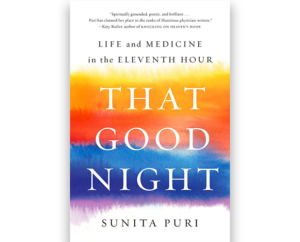
That Good Night by Sunita Puri
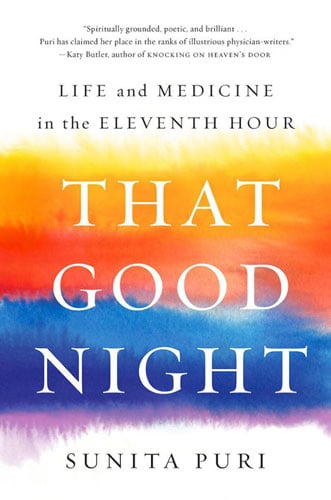 As the American born daughter of immigrants, Dr. Sunita Puri knew from a young age that the gulf between her parents’ experiences and her own was impossible to bridge, save for two elements: medicine and spirituality. Between days spent waiting for her mother, an anesthesiologist, to exit the OR, and evenings spent in conversation with her parents about their faith, Puri witnessed the tension between medicine’s impulse to preserve life at all costs and a spiritual embrace of life’s temporality. And it was that tension that eventually drew Puri, a passionate but unsatisfied medical student, to palliative medicine–a new specialty attempting to translate the border between medical intervention and quality-of-life care.
As the American born daughter of immigrants, Dr. Sunita Puri knew from a young age that the gulf between her parents’ experiences and her own was impossible to bridge, save for two elements: medicine and spirituality. Between days spent waiting for her mother, an anesthesiologist, to exit the OR, and evenings spent in conversation with her parents about their faith, Puri witnessed the tension between medicine’s impulse to preserve life at all costs and a spiritual embrace of life’s temporality. And it was that tension that eventually drew Puri, a passionate but unsatisfied medical student, to palliative medicine–a new specialty attempting to translate the border between medical intervention and quality-of-life care.
Interweaving evocative stories of Puri’s family and the patients she cares for, That Good Night is a stunning meditation on impermanence and the role of medicine in helping us to live and die well, arming readers with information that will transform how we communicate with our doctors about what matters most to us.
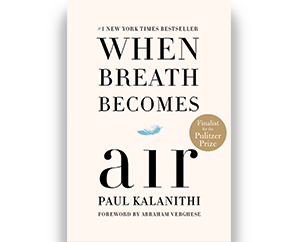
When Breath Becomes Air by Paul Kalanithi
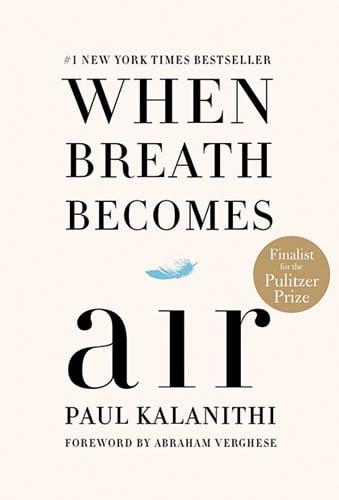 #1 New York Times Bestseller • Pulitzer Prize Finalist • Named One of the Best Books of the Year by The New York Times Book Review, People, NPR, The Washington Post, Slate, Harper’s Bazaar, Time Out New York, Publishers Weekly, and BookPage
#1 New York Times Bestseller • Pulitzer Prize Finalist • Named One of the Best Books of the Year by The New York Times Book Review, People, NPR, The Washington Post, Slate, Harper’s Bazaar, Time Out New York, Publishers Weekly, and BookPage
At the age of thirty-six, on the verge of completing a decade’s worth of training as a neurosurgeon, Paul Kalanithi was diagnosed with stage IV lung cancer. And just like that, the future he and his wife had imagined evaporated. When Breath Becomes Air chronicles Kalanithi’s transformation from a naïve medical student to a neurosurgeon at Stanford working on the brain, the most critical place for human identity, and finally into a patient and new father confronting his own mortality.
Paul Kalanithi died in March 2015 while working on this book, yet his words live on as a guide and a gift to us all. When Breath Becomes Air is an unforgettable, life-affirming reflection on the challenge of facing death and on the relationship between doctor and patient, from a brilliant writer who became both.
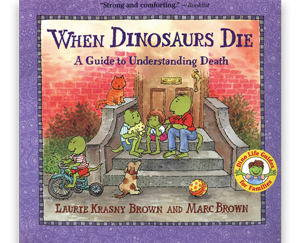
When Dinosaurs Die by Laurie Krasny Brown and Marc Brown
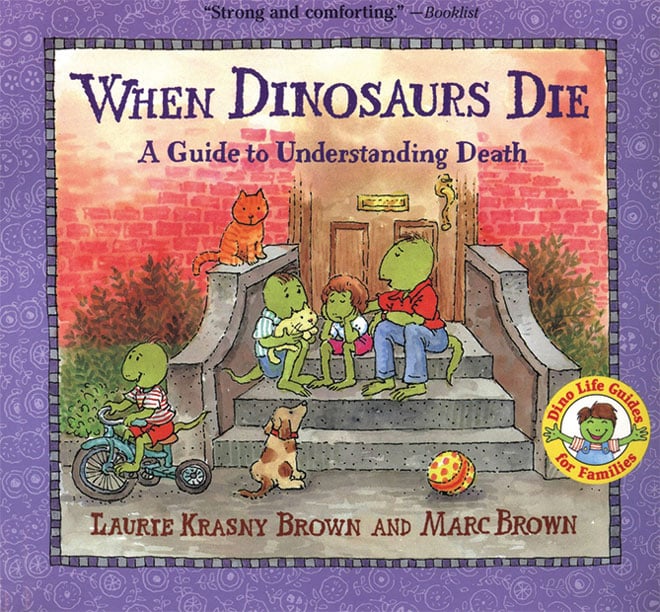 Straightforward and compassionate, When Dinosaurs Die explains death, dying, and coping with grief and loss in simple and accessible language for young kids and families.
Straightforward and compassionate, When Dinosaurs Die explains death, dying, and coping with grief and loss in simple and accessible language for young kids and families.
No one can really understand death, but to children, the passing away of a loved one can be especially perplexing and troublesome. This helpful book provides answers to kids’ most-often asked questions and also explores the feelings we may have regarding the death of a loved one, and the ways to remember someone after he or she has died.
Satisfying and comprehensive, this indispensable book is a comforting aid to help all children through a difficult time in their lives.
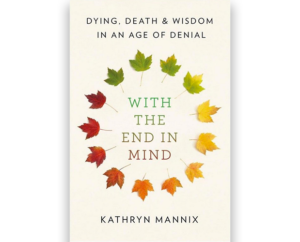
With the End in Mind by Kathryn Mannix
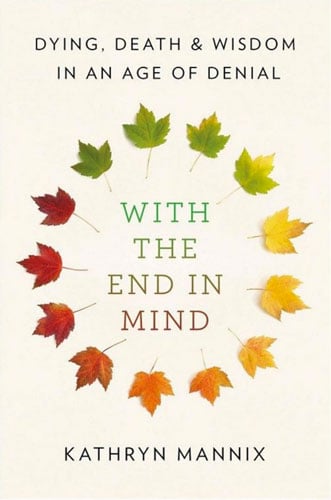 For readers of Atul Gawande and Paul Kalanithi, a palliative care doctor’s breathtaking stories from 30 years spent caring for the dying.
For readers of Atul Gawande and Paul Kalanithi, a palliative care doctor’s breathtaking stories from 30 years spent caring for the dying.
Modern medical technology is allowing us to live longer and fuller lives than ever before. And for the most part, that is good news. But with changes in the way we understand medicine come changes in the way we understand death. Once a familiar, peaceful, and gentle — if sorrowful — transition, death has come to be something from which we shield our eyes, as we prefer to fight desperately against it rather than accept its inevitability.
Dr. Kathryn Mannix has studied and practiced palliative care for thirty years. In With the End in Mind, she shares beautifully crafted stories from a lifetime of caring for the dying and makes a compelling case for the therapeutic power of approaching death not with trepidation, but with openness, clarity, and understanding. Weaving the details of her own experiences as a caregiver through stories of her patients, their families, and their distinctive lives, Dr. Mannix reacquaints us with the universal, but deeply personal, process of dying.
With insightful meditations on life, death, and the space between them, With the End in Mind describes the possibility of meeting death gently, with forethought and preparation, and shows the unexpected beauty, dignity, and profound humanity of life coming to an end.
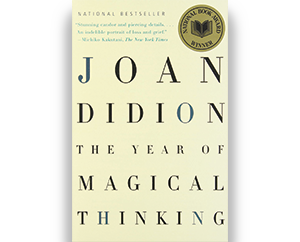
The Year of Magical Thinking by Joan Didion
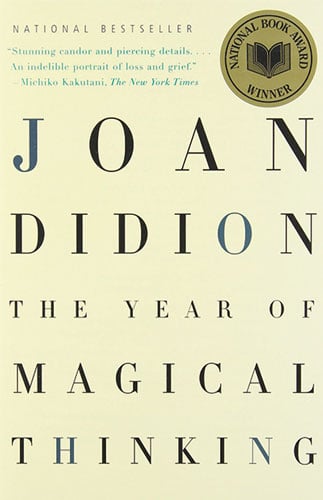 In the Year of Magical Thinking, Joan Didion explores an intensely personal yet universal experience; this book is a portrait of a marriage–and a life, in good times and bad–that will speak to anyone who has ever loved a husband or wife or child
In the Year of Magical Thinking, Joan Didion explores an intensely personal yet universal experience; this book is a portrait of a marriage–and a life, in good times and bad–that will speak to anyone who has ever loved a husband or wife or child
Several days before Christmas 2003, John Gregory Dunne and Joan Didion saw their only daughter, Quintana, fall ill with what seemed at first flu, then pneumonia, then complete septic shock. Days later the Dunnes were just sitting down to dinner after visiting the hospital when John Gregory Dunne suffered a massive and fatal coronary. In a second, this close, symbiotic partnership of forty years was over. Four weeks later, their daughter pulled through. Two months later, she collapsed and underwent six hours of brain surgery at UCLA Medical Center to relieve a massive hematoma.
This powerful book is Didion’s attempt to make sense of the “weeks and then months that cut loose any fixed idea I ever had about death, about illness… about marriage and children and memory… about the shallowness of sanity, about life itself.”
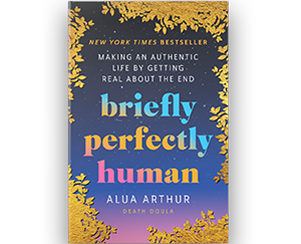
Briefly Perfectly Human by Alua Arthur
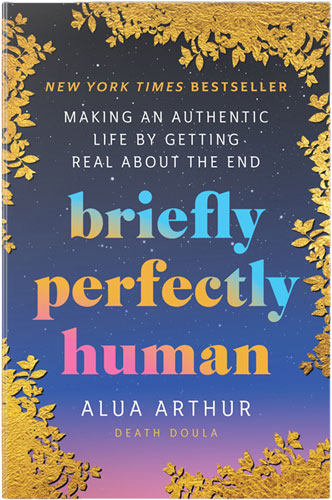
“By envisioning who I want to be on my deathbed, I invited life in.”
—Alua Arthur
For her clients and everyone who has been inspired by her humanity, Alua Arthur is a friend at the end of the world. As our country’s leading death doula, she’s spreading a transformative message: thinking about your death—whether imminent or not—will breathe wild, new potential into your life.
Warm, generous, and funny AF, Alua supports and helps manage end-of-life care on many levels. The business matters, medical directives, memorial planning; but also honoring the quiet moments, when monitors are beeping and loved ones have stepped out to get some air—or maybe not shown up at all—and her clients become deeply contemplative and want to talk. Aching, unfinished business often emerges. Alua has been present for thousands of these sacred moments—when regrets, fears, secret joys, hidden affairs, and dim realities are finally said aloud. When this happens, Alua focuses her attention at the pulsing center of her clients’ anguish and creates space for them, and sometimes their loved ones, to find peace.
This has had a profound effect on Alua, who was already no stranger to death’s periphery. Her family fled a murderous coup d’état in Ghana in the 1980s. She has suffered major, debilitating depressions. And her dear friend and brother-in-law died of lymphoma. Advocating for him in his final months is what led Alua to her life’s calling. She knows firsthand the power of bearing witness and telling the truth about life’s painful complexities, because they do not disappear when you look the other way. They wait for you.
Briefly Perfectly Human is a life-changing, soul-gathering debut, by a writer whose empathy, tenderness, and wisdom shimmers on the page. Alua Arthur combines intimate storytelling with a passionate appeal for loving, courageous end-of-life care—what she calls “death embrace.” Hers is a powerful testament to getting in touch with something deeper in our lives, by embracing the fact of our own mortality. “Hold that truth in your mind,” Alua says, “and wondrous things will begin to grow around it.”
LISTEN
Podcasts promote sharing of ideas through digital audio files.
Episodes can be listened for free (with ads) on Spotify; no ads with Spotify subscription or wherever you listen to your favorite podcasts.
Podcast can be accessed on Suzanne B O’Brien RN’s YouTube channel or wherever you listen to your favorite podcasts. Podcasts run about 40 mins
Postcasts run about 30-45 minutes
That’s a big mistake, because if you don’t have an end-of-life plan, your state’s laws decide who gets everything you own. A doctor you’ve never met could decide how you spend your last moments, and your loved ones could be saddled with untangling an expensive legal mess after you die.
Betsy Simmons Hannibal, a senior legal editor at legal website Nolo, puts it this way: Planning for the end of life isn’t about you. “You’re never going to really get the benefit of it. So you might as well think about how it’s going to be a lifetime gift that you’re giving now to your parents or your partner or your children. It really is for the people you love.”
Four prompts to drive conversations regarding the end of our life cycle:
I am…
Before I die, I want…
When I die, I want…
After I die, I want…
Interviews with different individuals covering the four prompts.
Episodes run anywhere from 1 to 2 hours.
GeriPal (Geriatrics and Palliative care) is a forum for discourse, recent news and research, and freethinking commentary. Our objectives are: 1) to create an online community of interdisciplinary providers interested in geriatrics or palliative care; 2) to provide an open forum for the exchange of ideas and disruptive commentary that changes clinical practice and health care policy; and 3) to change the world. We aim to be inclusive. We welcome the perspectives of generalists, specialists, gerontologists, palliative care clinicians, and anyone else interested in care of the elderly or palliative care.
Besides blogposts and articles, GeriPal hosts podcasts on various topics that can be accessed from their website or where you listen to your favorite podcasts.
Podcasts run about 50 mins
Jeremy Saunders and his friends, Taylor MacGillivary and Brian Stever, hosts.
Saunders has Cystic Fibrosis; he and his friends travel and interview people on illness, death and dying, often citing his own experiences with humor. Weekly episodes running between 30 minutes to an hour and a half.
Note: clicking the above links will take you away from HG Foundation’s website.

WATCH
Explore videos, feature or short films, and TED talks.
Featured Films + Movies
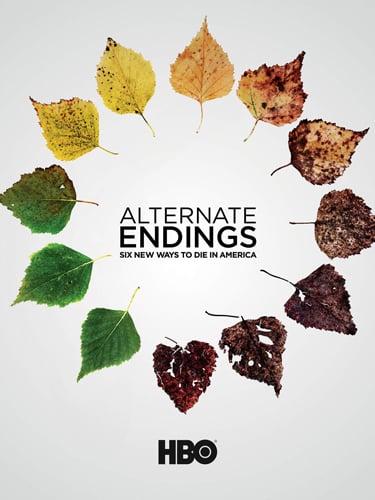 Directed and produced by Perri Peltz and Matthew O’Neill (HBO’s Axios), Alternate Endings: Six New Ways to Die in America offers a fascinating look at the varied ways Americans are choosing to both find meaning and celebrate life as it comes to an end.
Directed and produced by Perri Peltz and Matthew O’Neill (HBO’s Axios), Alternate Endings: Six New Ways to Die in America offers a fascinating look at the varied ways Americans are choosing to both find meaning and celebrate life as it comes to an end.
With attitudes about death and end-of-life choices rapidly changing, 2018 was the first time more Americans chose cremation over more expensive, traditional burials, disrupting the $16 billion a year funeral industry. As the baby boomer generation approaches death, more and more people are rethinking the ways end of life is recognized and are deciding to take control of what will happen when they die. Touching and heartfelt, the documentary spotlights a subject some might rather avoid, and presents it in a positive and thought-provoking manner – featuring stories of empowerment instead of avoidance.
Alternate Endings tells six stories of people nearing death and of family members of the recently deceased, who have chosen non-traditional end-of-life options and remembrances, from celebrations of life and living wakes, to green burials, extraterrestrial burials and more. Profoundly intimate and illuminating, the film explores what it means to be near death, either from age or terminal illness, and captures the healing power of honoring, giving thanks, and staying true to loved ones who have passed away.
Leila Johnson traveled to the Gulf of Mexico with her mother and aunt to place her father’s cremated remains in a memorial coral reef, a fitting tribute for a man who loved the ocean. After meeting with the director of Memorial Reef International who explains how the memorials create new habitats for ocean life devastated by dying coral, an emotional Leila mixes her father’s ashes with cement, adding a family photo she says will keep him company. The next morning, the cement reef is dropped in the ocean and Leila scuba dives to the seafloor to say a final goodbye, believing her father’s life has been given added meaning.
Guadalupe Cuevas, in San Antonio, Texas, has terminal cancer and is in renal failure. Guadalupe’s son and daughter, Guadalupe, Jr. and Alicia, are planning a living wake for their father, who says, “I’m going to feel like the luckiest person in the world” because his wife, kids and grandkids will all be with him at the gathering. On the day of the event, friends and family enjoy food and music and make emotional tributes to Guadalupe. On their decision to have a living wake, Guadalupe, Jr. says they wanted to make sure that “the guy who’s leaving knows he’s loved.” Guadalupe died peacefully on July 7, 2018 at the age of 80.
Barbara Jean Simon, in Austin, Texas, has pancreatic cancer and is planning her green burial, an environmentally-friendly alternative to traditional burial. Barbara travels to Eloise Woods Back to Nature Burials with her best friend TJ to pick out Barbara’s burial plot. Describing the process in which TJ will wash her body after she dies, Barbara says she’s overwhelmed by the unconditional love she feels. On April 28, 2018, Barbara died peacefully at home. Later, her friends and family wrap her body in biodegradable cloth and carry her to where she’ll be buried in a shallow grave next to a newly planted tree.
Sara Snider Green has chosen a space burial for her father “Tuna”, who she says was fascinated by space and time travel. Sara, her two kids and family friend Lisa are one of forty-five families who have come to Sierra County, New Mexico, to memorialize their loved ones by sending their cremated remains into space. Hitching a ride as a “secondary payload” with NASA, the families cheer as the rocket with the ashes of their loved ones is launched into space.
Dick Shannon, a former Silicon Valley engineer in Grass Valley, California, has terminal cancer. Having exhausted his treatment options, Dick has decided to use “medical aid in dying” (MAID), a legal procedure in the state. At a doctor’s visit, Dick and his wife learn the parameters for how he should take the drug cocktail that will end his life. Six months later, with his lungs failing, Dick hosts a get-together of close friends to say goodbye, and later shares a last dinner with his family. With his loved ones at his side, Dick died on his own terms on May 1, 2018. He was 76.
Emily and Ryan Matthias, in Van Meter, Iowa, had a five-year-old son Garrett who was diagnosed with terminal cancer in 2017. When Garrett died, his parents respected his wishes not to have a funeral and instead held a party, a celebration of life, which took place ten days after his death. The event had everything that Garrett wanted – bouncy houses, snow cones and lots of kids having fun.
Alternate Endings: Six New Ways to Die in America is directed and produced by Matthew O’Neill and Perri Peltz; executive producers, Sheila Nevins, Jacqueline Glover; produced by Leah Williams, Xochitl Dorsey; edited by David Meneses; cinematography, Taylor Krauss and Matthew O’Neill; original music by Jonathan Zalben.
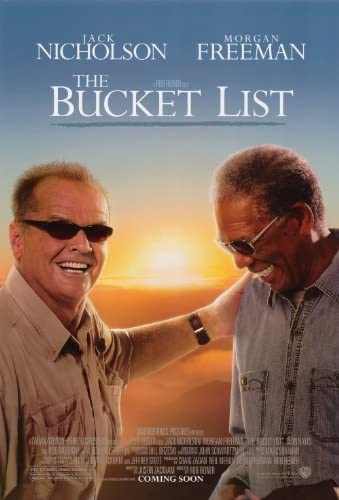 Billionaire Edward Cole (Jack Nicholson) and car mechanic Carter Chambers (Morgan Freeman) are complete strangers, until fate lands them in the same hospital room. The men find they have two things in common: a need to come to terms with who they are and what they have done with their lives, and a desire to complete a list of things they want to see and do before they die. Against their doctor’s advice, the men leave the hospital and set out on the adventure of a lifetime.
Billionaire Edward Cole (Jack Nicholson) and car mechanic Carter Chambers (Morgan Freeman) are complete strangers, until fate lands them in the same hospital room. The men find they have two things in common: a need to come to terms with who they are and what they have done with their lives, and a desire to complete a list of things they want to see and do before they die. Against their doctor’s advice, the men leave the hospital and set out on the adventure of a lifetime.
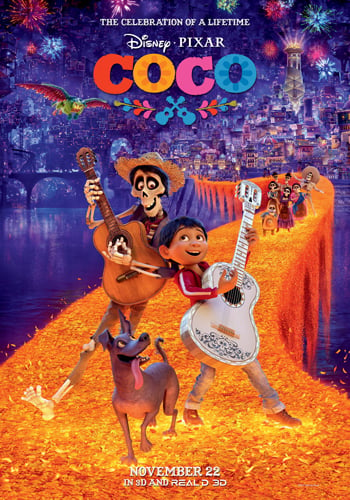 In Disney/Pixar’s vibrant tale of family, fun and adventure, aspiring young musician named Miguel (voice of newcomer Anthony Gonzalez) embarks on an extraordinary journey to the magical land of his ancestors. There, the charming trickster Hector (voice of Gael Garcia Bernal) becomes an unexpected friend who helps Miguel uncover the mysteries behind his family’s stories and traditions.
In Disney/Pixar’s vibrant tale of family, fun and adventure, aspiring young musician named Miguel (voice of newcomer Anthony Gonzalez) embarks on an extraordinary journey to the magical land of his ancestors. There, the charming trickster Hector (voice of Gael Garcia Bernal) becomes an unexpected friend who helps Miguel uncover the mysteries behind his family’s stories and traditions.
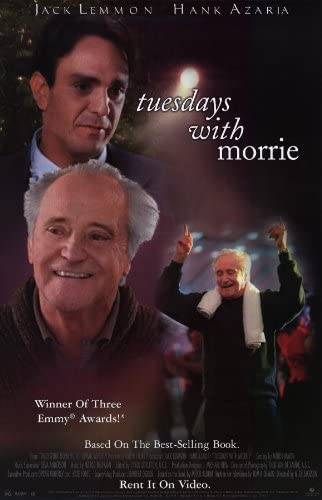 Accomplished sports writer Mitch Albom (Hank Azaria) feels that his life is lacking, despite his success. When Mitch watches a television interview with his former university professor, Morrie Schwartz (Jack Lemmon), he is moved to reconnect with his old mentor, who is struggling with Lou Gehrig’s disease. As Mitch and Morrie get reacquainted, they engage in thoughtful conversations about a variety of significant topics, including love, happiness and death.
Accomplished sports writer Mitch Albom (Hank Azaria) feels that his life is lacking, despite his success. When Mitch watches a television interview with his former university professor, Morrie Schwartz (Jack Lemmon), he is moved to reconnect with his old mentor, who is struggling with Lou Gehrig’s disease. As Mitch and Morrie get reacquainted, they engage in thoughtful conversations about a variety of significant topics, including love, happiness and death.
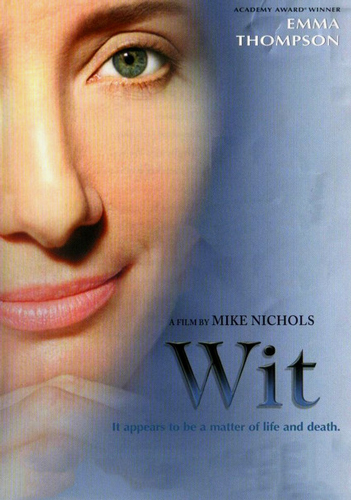 Professor Vivian Bearing (Emma Thompson), an expert on the work of 17th-century British poet John Donne, has spent her adult life contemplating religion and death as literary motifs. Diagnosed with advanced ovarian cancer, she consents to an aggressive and experimental form of chemotherapy administered by Dr. Kelekian (Christopher Lloyd) and his assistant, Dr. Posner (Jonathan M. Woodward), her former student. Facing death on a personal level, she reflects on her life and work.
Professor Vivian Bearing (Emma Thompson), an expert on the work of 17th-century British poet John Donne, has spent her adult life contemplating religion and death as literary motifs. Diagnosed with advanced ovarian cancer, she consents to an aggressive and experimental form of chemotherapy administered by Dr. Kelekian (Christopher Lloyd) and his assistant, Dr. Posner (Jonathan M. Woodward), her former student. Facing death on a personal level, she reflects on her life and work.
Featured Talks

A Brief but Spectacular Take on Compassionate Care During COVID-19
Dr. Diane Meier is the director of the Center to Advance Palliative Care in New York City. As a palliative care specialist, she has an intimate view of how the coronavirus pandemic is affecting patients and their loved ones. Meier shares her Brief But Spectacular take on showing compassion during COVID-19.

The Journey Through Loss And Grief
In her brutally honest, ironically funny and widely read meditation on death, “You May Want to Marry My Husband,” the late author and filmmaker Amy Krouse Rosenthal gave her husband Jason very public permission to move on and find happiness. A year after her death, Jason offers candid insights on the often excruciating process of moving through and with loss — as well as some quiet wisdom for anyone else experiencing life-changing grief.
 In a talk that’s by turns heartbreaking and hilarious, writer and podcaster Nora McInerny shares her hard-earned wisdom about life and death. Her candid approach to something that will, let’s face it, affect us all, is as liberating as it is gut-wrenching. Most powerfully, she encourages us to shift how we approach grief. “A grieving person is going to laugh again and smile again,” she says. “They’re going to move forward. But that doesn’t mean that they’ve moved on.”
In a talk that’s by turns heartbreaking and hilarious, writer and podcaster Nora McInerny shares her hard-earned wisdom about life and death. Her candid approach to something that will, let’s face it, affect us all, is as liberating as it is gut-wrenching. Most powerfully, she encourages us to shift how we approach grief. “A grieving person is going to laugh again and smile again,” she says. “They’re going to move forward. But that doesn’t mean that they’ve moved on.”
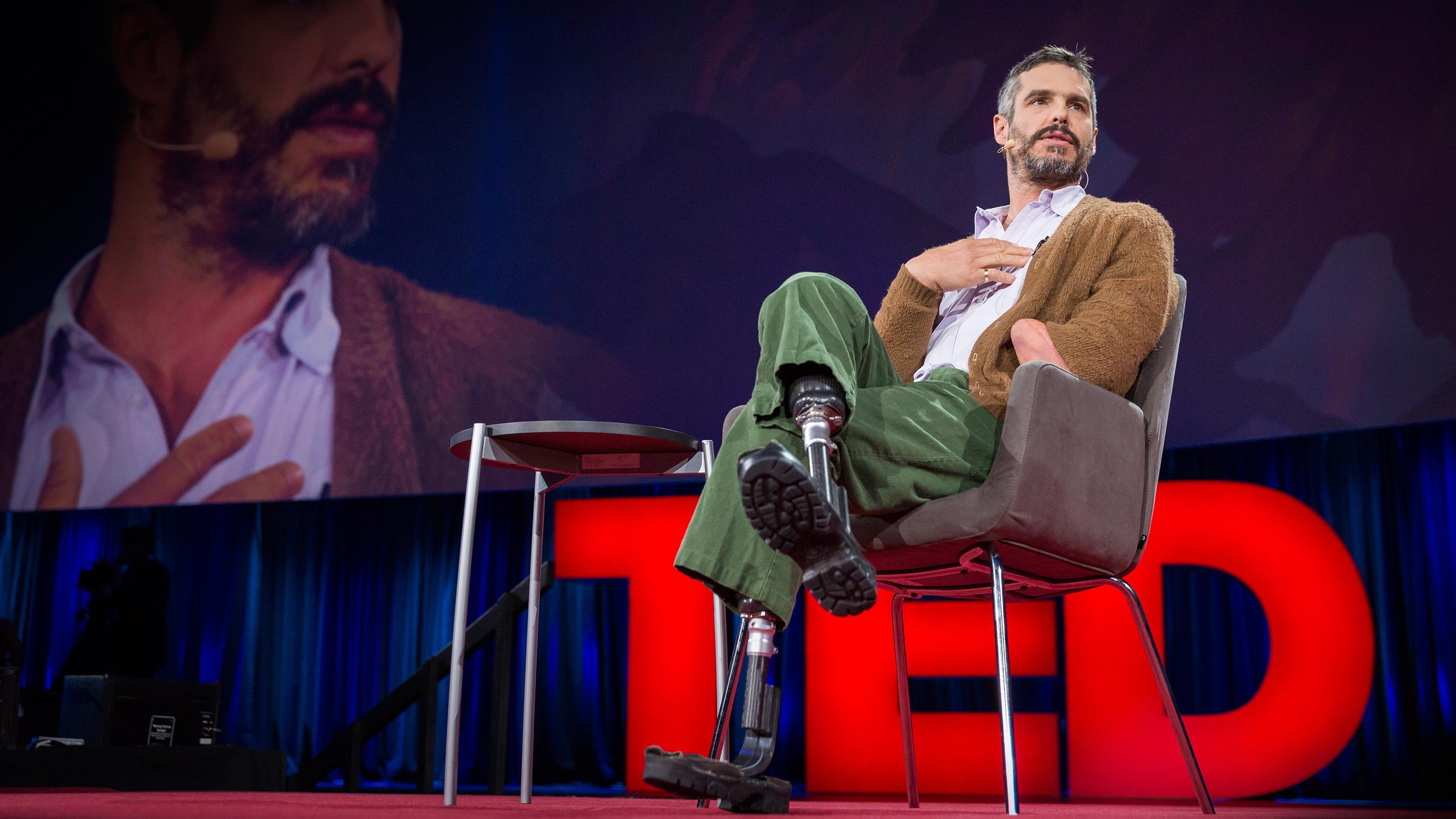
What Really Matters At The End Of Life
At the end of our lives, what do we most wish for? For many, it’s simply comfort, respect, love. BJ Miller is a hospice and palliative medicine physician who thinks deeply about how to create a dignified, graceful end of life for his patients. Take the time to savor this moving talk, which asks big questions about how we think on death and honor life.

What Makes Life Worth Living In The Face of Death
In this deeply moving talk, Lucy Kalanithi reflects on life and purpose, sharing the story of her late husband, Paul, a young neurosurgeon who turned to writing after his terminal cancer diagnosis. “Engaging in the full range of experience — living and dying, love and loss — is what we get to do,” Kalanithi says. “Being human doesn’t happen despite suffering — it happens within it.”

Why thinking about death helps you live a better life
“As a death doula, or someone who supports dying people and their loved ones, Alua Arthur spends a lot of time thinking about the end of life. In a profound talk that examines our brief, perfectly human time on this planet, she asks us to look at our lives through the lens of our deaths in seeking to answer the question: “What must I do to be at peace with myself so that I may live presently and die gracefully?”
The Journey Through Loss And Grief
What Really Matters At The End Of Life
What Makes Life Worth Living In The Face of Death
Prepare for a Good End of Life
A brief but spectacular take on compassionate care during COVID-19
Why Thinking About Death Helps You Live a Better Life
Note: clicking the above links will take you away from HG Foundation’s website.
OUR VIDEO LIBRARY
Created by Hospice Giving Foundation from interviews, personal storytelling, and inspiring educators.
In January 2019, CEO Siobhan Greene had the opportunity to interview two of the founders of the first Hospice in Monterey. Oncology nurse Becky Allen and psychologist Stephen Connor worked with Dr. Jerry Rubin in the 1970s. This series of interview clips share their stories and the rich history of compassion through end of life in Monterey County.


